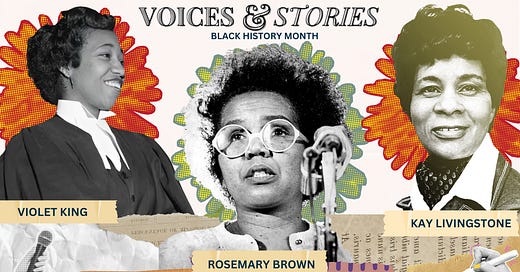Violet King
Violet King was the ultimate trailblazer in many ways - becoming the first Black Canadian (not just woman) to earn a law degree in Alberta, as well as the first Black woman ever to become a lawyer in Canada. She was an incredible and barrier-breaking woman - paving the way for equality for Black Canadians across the country.
Born in Calgary in 1929, Violet grew up in Alberta. Her grandparents had emigrated from the United States in 1911, part of a government campaign that encouraged American farmers to relocate to Canada. However, while Black individuals started to respond, the government unfortunately began actively discouraging Black immigration - even going to far as to impose a limit of 1,000 Black immigrants to the prairies by 1912, the year after Violet’s grandparents arrived.
This created a difficult time to be growing up in Canada. Violet’s parents worked hard - her dad a sleeping car porter and her mum a seamstress, raising four children. Violet worked hard at school and always knew that she wanted to become a lawyer - even writing that goal in her high school yearbook. She went on to study at the University of Alberta, starting her degree in 1948. She worked to support her studies by teaching piano lessons in the city of Edmonton, while juggling her legal studies as one of only three women within the Faculty of Law. Despite those commitments already, Violet was actively involved with the student community, including being a member of the Blue Stocking Club (women discussing history and socio-political affairs), vice-president of the students’ union, union representative to National Federation of Canadian University Students, as well as being elected class historian.
Violet graduated in 1952 with her BA, and in 1953 earned her LLB degree. This made her the only woman in that graduating class, as well as the first Black person ever to graduate from law school in Alberta. Her passion for criminal justice led her to article with a firm based in Calgary, led by Edward J. McCormick, a leading criminal trial lawyer. During this time, she worked on five murder trials and was called to the Alberta Bar in 1954. This was a historic moment which was recognized by the national press - she was the first Black female lawyer to practice law in Canada.
Violet continued to expand her career, practicing law with another firm in Calgary, as she continued to gain public recognition and a profile. She would use her platform, when invited to speak on racism in the workplace as well as the challenges for women in the workforce, in particular hoping for a future world where ability was prioritized over race or gender.
Violet then took on a new job in Ottawa, working with the federal department of Citizenship and Immigration. This role saw her travelling across the country, engaging with leaders across communities. She continued her work in the department for seven years, taking on a broad range of positions and responsibilities, including working directly with the Canadian Citizenship Council.
In 1963, Violet was appointed Executive Director of the Newark YMCA’s Community Branch. This role included helping Black applicants who were actively looking for opportunities for employment. After six years in the job (during which she got married and had a daughter), Violet moved to Chicago with her family, becoming the Director of Planning in 1969. After a subsequent post as Director of Manpower, Planning and Staff Development, she became Executive Director of the National Council of YMCA’s Organizational Development Group - becoming the first woman to ever hold an executive position within the ‘Y’.
Violet’s life was full of incredible achievements, paving the way for future generations of any background. Her inspiring actions and dedication make it hard to believe she died aged only 52. She passed away from cancer in New York in 1982.
We hope you enjoyed this short profile on Nancy Greene Raine! For more information on her and other trailblazers, check out The Canadian Encyclopedia online, Historica Heritage Minutes and the Women of Impact Gallery.
Do you have a Canadian heroine you’d like to see featured in Voices & Stories? Have any suggestions for us? Don’t hesitate to leave a comment or a direct message on our Substack (or at any of our socials!).
You can also get in touch by email at communications@womenshistoryproject.ca




